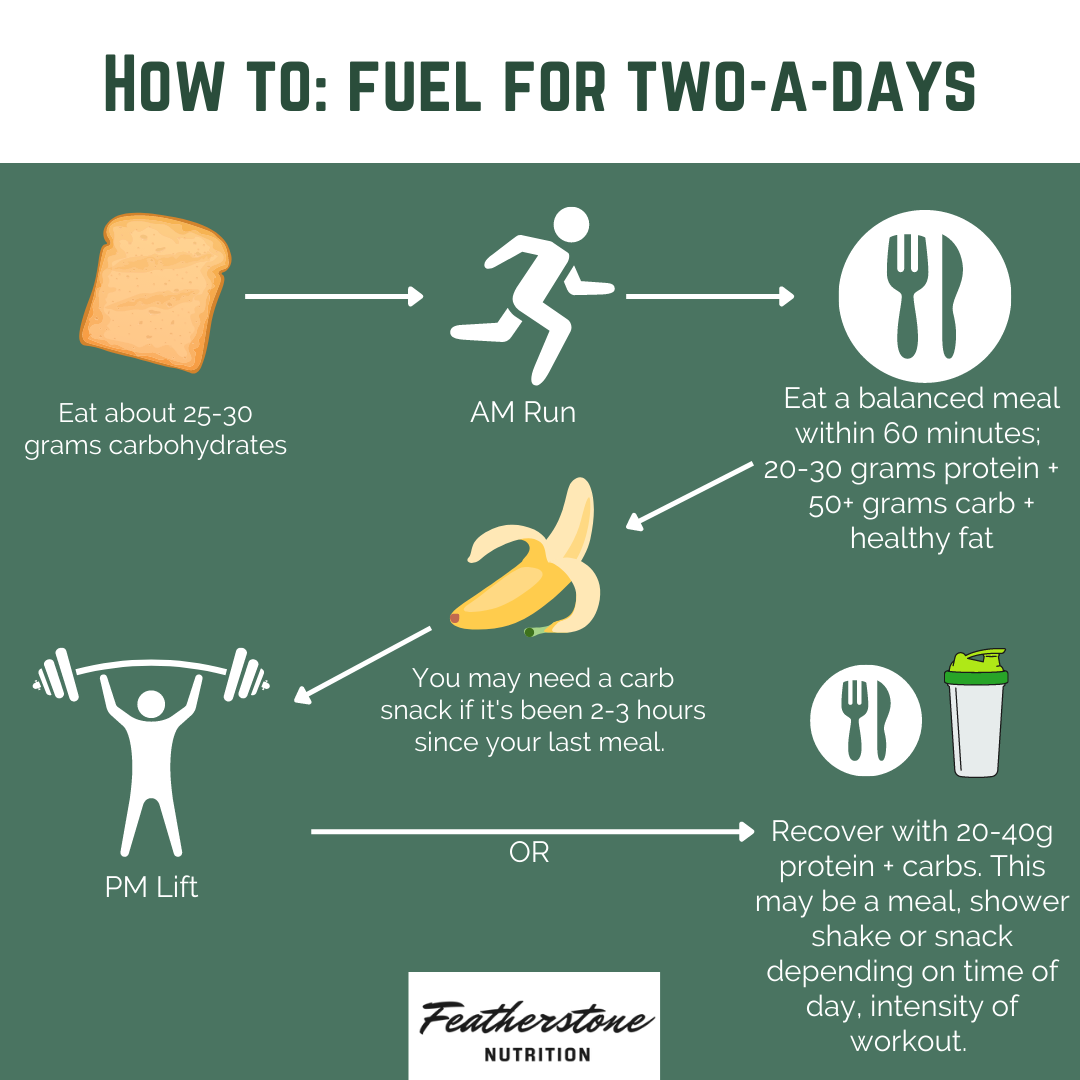Fueling for Runners Part II: Fueling for Strength Training & Two-a-Days
Last week, we explored why and how you should fuel for long and short runs and speed sessions. Now let’s move on to other types of training that a lot of athletes ask me about: strength training sessions and two-a-days. Keep reading to find out why your fueling needs for these workouts are different, what happens if you’re not eating adequately for your workouts and how you can power up your performance by making just a few simple fueling tweaks.
When considering your fueling needs for running, you should take into account both exercise duration and intensity. It’s an even bigger consideration when you throw strength training into the mix as a standalone session or part of a two-a-day. Whether you’re leaping through plyometric exercises or lifting barbells, kettlebells, and other weights, gym workouts tend to be high intensity. And as you could be using many different muscle groups, you’re going to consume an awful lot of energy in even your shortest strength or power workouts. Going for a run the same day? Now you need even more fuel.
The trouble I find with many new clients whose gym sessions and two-a-days aren’t working for them isn’t the programming itself; it’s that they only focus on fueling for runs OR workouts and usually aren’t sure how to fuel for BOTH. Not fueling your body properly for your workouts can lead to short changing your sessions and overall gains.
Why you need carbs before strength workouts
Much like with running, gym training requires quick-acting fuel that’s available on demand. This is a prerequisite for rapid muscle contractions – concentric as you shorten the muscle fibers and eccentric while you lengthen them under tension. These kinds of exercises not only require you to move quickly but also powerfully (think the combination of strength and velocity), which recruits a greater number of muscle fibers and takes even more energy.
A review released via Sports Medicine stated that carbs make “a greater relative contribution to energy production where exercise is of moderate-to-high intensity,” with standard volume strength training depleting glycogen stores by 24 to 40 percent. The authors explained that this can be much higher, referencing a prior study that observed glycogen running out in certain muscle fibers. With this in mind, they concluded that ingesting pre-workout carbs improves performance in high-volume strength workouts lasting 45 minutes or longer and/or when you haven’t eaten for eight hours (such as when you hit the gym first thing in the morning).
These physiological demands show why it’s essential that you’ve got enough fast fuel available to go into overdrive set after set and rep after rep, like a car getting a nitrous oxide boost in The Fast and the Furious. This means blood glucose first and stored glycogen second, both of which are provided by – you guessed it, carbohydrates. Just like on your runs, fat could potentially be utilized for fuel in your strength training but because it takes so long to access and utilize, it’s unsuited to the task. Instead, plan to top up your gas tank with carbs before you hit the weights, which you could get from a piece of toast, half a bagel or muffin, or a small bowl of cereal. Afterwards, don’t forget your post-workout recovery nutrition of protein + carbs (we will discuss recovery nutrition in future articles).
How do I fuel for a two-a-days?
Some athletes find it challenging enough to dial in their fueling for a single daily workout, so what happens when we throw two-a-days into the mix? If you are not fueling adequately, the answer is often that you end up in a calorie deficit, don’t intake sufficient protein to start the repair process, and consume too few carbs to replenish your glycogen stores for the second session. As a result, you might be sluggish and slow during training and fatigued and sore afterward.
To avoid this, aim to take in at least 25 to 30 grams of carbs before lifting or running (whatever comes first), and make it more if you’re planning to go longer or harder. If you have hours in between your workouts, you should refuel in between with a combination of carbs and protein with three purposes in mind – replenishing nutrients you just used, beginning the repair process, and fueling up for what’s to come.
Another review of studies that investigated the link between carb intake and resistance training noted that if “there is another high-intensity workout planned that day for the same musculature, higher carbohydrate intakes up to 1.2 g/kg/h may be warranted to maximize glycogen resynthesis in between workouts.” An International Society of Sports Nutrition position paper suggested “combining carbohydrates (0.8 g/kg/h) with protein (0.2-0.4 g/kg/h)” when there’s less than four hours between workouts. While whole grains and low-glycemic foods are often nutrient rich, they recommended easily digestible ones that are high on the glycemic index when trying to refuel between two-a-day workouts.
These numbers might seem like they only complicate matters but refueling post-run and pre-lift or vice versa doesn’t need to be tricky. Eat a meal or large snack that includes carbs + protein, such as cottage cheese with fruit, or a buffalo chicken salad sandwich. If you need something quick & easy, try a Shower Shake that also includes protein powder, oats and fruit. Quantities of carbs and protein is depending on your body size, age & workouts, as well as if your recovery nutrition is a snack or a meal.
In addition to providing more fuel for the physical side of your second workout, fueling in between your two-a-days will help you achieve better cognitive performance. If your blood sugar is too low after the first session, you’ll probably struggle to focus and pay attention during the second one. Whereas if you eat carbs, you’ll be more alert and focused, maintain proper form, and concentrate on cues that can ensure you have a high-quality session.

How do I fuel for a strength training immediately before running?
If you lift and run back-to-back, take a guess at what our fuel source before each segment is…CARBS! Aim to take 25-30 grams of carbs before your lift and then another 25-30 grams of carb before your run (or more if you are running >70 minutes). See our last blog post for tips and examples.
In summary, you should always fuel with carbs before every run and strength training workout. Eating solid meals between two-a-days is also a must. Don’t worry if you have to add an extra snack or meal during the day and/or another one at night – your body needs that additional energy to perform and recover well. Stay tuned to future articles focusing on recovery post-runs and workouts.
Check back soon for the final installment of this series, in which we’ll break down fueling for race day.
1. Andrew King, “The Ergogenic Effects of Acute Carbohydrate Feeding on Resistance Exercise Performance: A Systematic Review and Meta-Analysis,” Sports Medicine, July 9, 2022, available online at https://link.springer.com/article/10.1007/s40279-022-01716-w. 2. Harry P. Cintineo et al, “Effects of Protein Supplementation on Performance and Recovery in Resistance and Endurance Training,” Frontiers in Nutrition, September 11, 2018, available online at https://www.ncbi.nlm.nih.gov/pmc/articles/PMC6142015/#B28. 3. Daniel W.D. West et al, “Whey Protein Supplementation Enhances Whole Body Protein Metabolism and Performance Recovery after Resistance Exercise: A Double-Blind Crossover Study,” Nutrients, July 11, 2017, available online at https://www.ncbi.nlm.nih.gov/pmc/articles/PMC5537849. 4. Menno Henselmans et al, “The Effect of Carbohydrate Intake on Strength and Resistance Training Performance: A Systematic Review,” Nutrients, February 18, 2022, available online at https://www.mdpi.com/2072-6643/14/4/856. 5. Chad M. Kerksick et al, “International Society of Sports Nutrition Position Stand: Nutrient Timing,” Journal of the International Society of Sports Nutrition, August 29, 2017, available online at https://pubmed.ncbi.nlm.nih.gov/28919842.
Disclaimer: The content in our blog articles provides generalized nutrition guidance. The information above may not apply to everyone. For personalized recommendations, please reach out to your sports dietitian. Individuals who may chose to implement nutrition changes agree that Featherstone Nutrition is not responsible for any injury, damage or loss related to those changes or participation.




So many days I have a run and strength session. I like to get them both done back to back so I don’t have to break up my day with a morning run and afternoon lift session. However, is it best to break them up with a few hours in between to make sure I replace my glyogen stores vs coming back from my run and lifting immediately after? Or does it matter as long as I was properly fueled before my run and then refuel immediately after that lift session.
*”So, many days”
*”glycogen stores”
When doing back to backs I am literally going for my run (except leg days which I do after my run) immediately after strength training so I’d only have a few minutes to eat something before heading out the door. Do you still recommend something like a banana or could I eat energy chews or gels instead?
Yes, you can definitely do a gel or chews instead!
You can definitely do them back-to-back! Fuel with carbs before your run, during the run (depending on length), and then after your run/before lifting. After your lift, try to get adequate protein + carbs within 30 minutes.